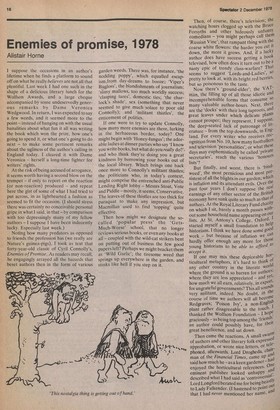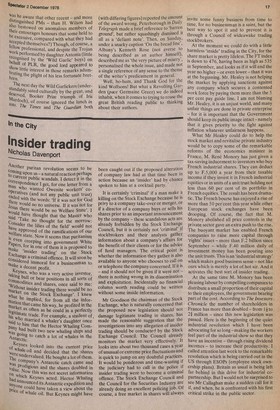Enemies of promise, 1978
Alistair Horne
I suppose the occasions in an author's lifetime when he finds a platform to sound off on what he really believes are not all that plentiful. Last week I had one such in the shape of a delicious literary lunch for the Wolfson Awards, and a large cheque accompanied by some undeservedly generous remarks by Dame Veronica Wedgwood. In return, I was expected to say a few words, and it seemed more to the point instead of banging on with the usual banalities about what fun it all was writing the book which won the prize, how one's going to spend it, or what one's going to do next — to make some pertinent remarks about the ugliness of the author's calling in England today. I cleared it with Dame Veronica — herself a long-time fighter for writers' rights.
At the risk of being accused of arrogance, it seems worth having a second blow on the trumpet — if only to report on the reaction (or non-reaction) produced — and repeat here the gist of some of what I had tried to put across, in as lighthearted a fashion as seemed to fit the occasion. (I should stress there was certainly no conceivable personal gripe in what I said, in that — by comparison with too depressingly many of my fellow authors — I suppose I have been indecently lucky. Especially last week.) Noting 'how many predators as opposed to friends the profession has (we really are Nature's guinea-pigs), I took as text that forty-year-old classic of Cyril Connolly's, Enemies of Promise. As readers may recall, he engagingly arrayed all the hazards that beset authors then in the form of various garden weeds. There was, for instance, 'the nodding poppy', which equalled escapism,from day-dreams to booze; 'Viper's B the blandishments of journalism; allows, too much worldly success; 'slimy lu ly° ms' 'clasping tares', domestic ties; 'the charlock's shade', sex (something that never seemed to give much solace to poor old Connolly); and 'militant thistles', the enticement of politics.
If one were to try to update Connolly, how many more enemies are there, lurking in the herbaceous border, today? One might begin with 'Honey-fungus'; the adorable ladies at dinner parties who say'! know you write books, but what do you really do?'., and who think they're doing you a great kindness by borrowing your books out of the local library. Which brings one back once more to Connolly's militant thistles;' the politicians who, in today's context, might comprise the entrenched anti-Public Lending Right lobby — Messrs Stoat, Vote and Piddle — mostly, it seems, Conservative. The leaves of these thistles are too thick for paraquat to make any impression, but Macmillan used to find 'topping' quite effective.
Then how might we designate the socalled 'popular press' the 'GetsMuch-Worse' school, that no longer reviews serious books, or even any books at all — coupled with the wild-cat strikers bent on putting out of business the few good papers left? Perhaps we might bracket them as 'Wild Garlic'; the tiresome weed that springs up everywhere in the garden, and stinks like hell if you step on it. Then, of course, there's television; the watching hours clogged up with the Bruce Forsyths and other hideously unfunny comedians — you might perhaps call them 'Russian Vine'; that rampant thing with the coarse white flowers: the harder you cut it down, the more it grows. And, if a lucky author does have success getting a book televised, how often does it turn out to be a nasty epic of trendy class-warfare? That seems to suggest 'Lords-and-Ladies', so pretty to look at, with its bright red berries, but so poisonous to the taste. Now there's `ground-elder'; the VAT man, the filling up of all those idiotic and incomprehensible forms that consume s° many valuable author-hours. Next, there are the 'docks' with their long taproots, and great leaves under which delicate plants cannot prosper; they represent, I sum:lose' the deep-seated lack of patronage of literature — from the top downwards, in England. For every writer who receives recognition from No. 10, how many footballers and television 'personalities', or what these days may euphemistically be called 'private secretaries', reach the various 'honours lists'? But finally, and worst, there is 'bind weed', the most pernicious and most persistent of all the blights in our garden; which is inflation and its attendant evils. Over the past four years I don't suppose the Nal earnings of any other sector of the British economy have sunk quite so much as that of on which I sit, barely a month passes with authors. At the Y e Royal Literary Fund chari out some household name appearing on °I°, lists. At St. Antony's College, Oxford, started myself a small foundation to hel„,P historians. I think we have done some gotw work — but because of inflation we call hardly offer enough any more for those young historians to be able to afford w accept it. If one may mix these deplorable horticultural metaphors, it's hard to think °Af any other country in the literate worlu where the ground is so barren for authors; where they are less appreciated — and Yet' how much we all earn, relatively, in exPoq' for ungrateful governments? This all sounds very militant, indeed. No doubt, in the course of time we authors will all become Redgraves; 'Poison Ivy', a non-English, plant rather disagreeable to the touch. ' thanked the Wolfson Foundation — hoPe, graciously — as being top among the 'friends an author could possibly have, for theil great beneficence, and sat down. Then came the reactions. A small swarlhd of authors and other literary folk expresse approbation, or wrote nice letters, or telephoned, afterwards, Lord Drogheda, ellairci man of the Financial Times, came UP arlA said how much he —as a keen gardener—ha; enjoyed the horticultural references. Oltd eminent publisher looked unhaPPY described what I had said as'controveraia', Lord Longford berated me for being beastlYt to Lady Falkender. (I hastened to point °I1A that I had never mentioned her name, ati" was he aware that other recent — and more distinguished PMs — than H. Wilson had also bestowed on anomalous members of their entourages honours that some held to be excessive, compared with what they had accepted themselves?) Though, of course, a fellow professional, and despite the Trojan work performed by daughter Antonia (little recognised by the 'Wild Garlic' boys) on behalf of PLR, the good lord appeared to show little interest in those remarks adum brating the plight of his less fortunate brethren.
The next day the Wild Garlickers (understandably sated culturally by the great, and deserved, Booker Prize triumph of Iris Murdoch), of course ignored the lunch in toto. The Times and The Guardian both (with differing figures) reported the amount of the award wrong. Peterborough in Daily Telegraph made a brief reference to 'barren ground', but rather squashingly dismissed it all as a 'defiant note'. Then, on Sunday, under a snarky caption 'On the bread line', Albany's Kenneth Rose (not averse to being described as an author himself), described me as 'the very picture of misery', personalised the whole issue, and made not a single reference of any sense to the theme of the writer's predicament in general. Well, ho-hum, and Thank God for the kind Wolfsons! But what a Revolting Garden (pace Germaine Greer) we do indeed inhabit, when it comes to trying to rouse the great British reading public to thinking about their authors.







































 Previous page
Previous page